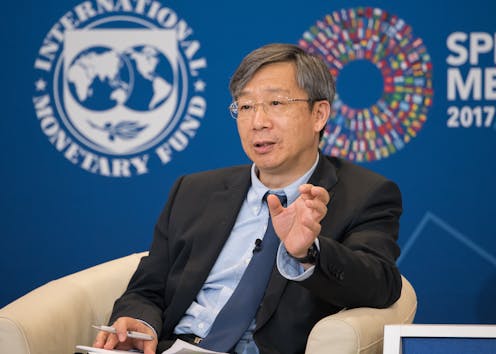China's new central bank governor will have to deal with massive debt and an ambitious economic agenda
- Written by Hui Feng, Future Fellow and Senior Research Fellow, Griffith University

The Chinese government has appointed a new head[1] of its central bank. Yi Gang, currently the deputy governor of the People’s Bank of China, will take over the leadership from Zhou Xiaochuan, who had been in the position since 2002.
As China’s central bank oversees the stability of the world’s second-largest economy[2] and the world’s largest pile of foreign reserves[3], this is a change the global economy is watching closely.
A US-trained economist, Yi received his doctorate in economics from the University of Illinois in 1986. He was a professor at Peking University in China following various academic positions in the US, before joining China’s central bank in 1997. Yi is known[4] in academia for his expertise on inflation and price instability.
Read more: What we can expect from China's economy in 2018[5]
Yi developed his technocratic career exclusively within the headquarters of the central bank, taking up various leading positions in areas of monetary policy, exchange rate policy, and foreign reserve management. He then became the right-hand man of Zhou, who dominated Beijing’s economic policy-making for a record 15 years.
However Yi’s governorship came as a surprise, given the widely circulated rumours of other powerful contenders, such as Liu He, now announced as a vice premier of China, and Guo Shuqing, the chairman of China Banking Regulatory Commission.
But the appointment makes sense if the reshuffle of president Xi Jinping’s economic team is taken into account, as like-minded liberals lining up in key positions. Yi will actually work directly under Liu, who also trained in the US, ensuring that the government keeps in close consultation with the central bank while the bank does not stray politically.
Now that the jockeying for the top position at the central bank is over, the new governor is bound to carry on Zhou’s liberal legacy and to tackle some of the more daunting challenges the Chinese economy faces.
First up is the need to further strengthen the central bank, which has been given extra duties in financial legislation and regulation in the latest round of administrative streamlining announced at the People’s Congress. After all, the authority of the central bank in government circles over the last two decades has largely hinged on the bank playing an indispensable role[6] in providing professional expertise.
Read more: China’s Social Credit System puts its people under pressure to be model citizens[7]
Yi will also work to defuse the debt bomb that has been lurking behind a series of alarming statistics of the Chinese economy. In particular, China’s total debt has almost doubled between 2008 and mid-2017, to 256% of GDP[8] as the economy slowed down from double-digit growth to a mere 6%.
A distressed financial system could trigger a systemic economic collapse. To reign in this possibility, Yi will have to work closely with authorities in the State Council, China’s cabinet, to contain the risks to a manageable scale.
The bank will have to walk a fine line here. It must contain the shadow banking sector, which is largely beyond the radar of the authorities. At the same time it has to make sure such tightening does not choke financial innovations embodied by the burgeoning internet finance and fintech.
Equally, if not more important, the financial reforms must be taken to facilitate China’s grand economic transition. In the short to medium term, this entails a further aligning of China’s interest rates to China’s market levels.
They also need to bring its exchange rates in line with international market levels, open its financial markets in a gradual and orderly fashion, and push for the use of the Chinese currency in the global market. This is an ambitious project initiated by Zhou with the goal of seeing the renminbi’s international status on par with the greenback.
A more open and liberal financial system in China is of course good news for the world economy as well because central banks need to work together to address increasingly divergent policy priorities among advanced and emerging economies.
Whether or not Yi becomes the next “Mr RMB[9]” (as Zhou is often dubbed), he needs to be the “Dr Reformer” at this critical stage of both the Chinese and global economy.
References
- ^ appointed a new head (www.xinhuanet.com)
- ^ the world’s second-largest economy (www.theguardian.com)
- ^ the world’s largest pile of foreign reserves (www.reuters.com)
- ^ known (www.chinavitae.com)
- ^ What we can expect from China's economy in 2018 (theconversation.com)
- ^ an indispensable role (www.jstor.org)
- ^ China’s Social Credit System puts its people under pressure to be model citizens (theconversation.com)
- ^ China’s total debt has almost doubled between 2008 and mid-2017, to 256% of GDP (www.bloomberg.com)
- ^ Mr RMB (english.cctv.com)
Authors: Hui Feng, Future Fellow and Senior Research Fellow, Griffith University







